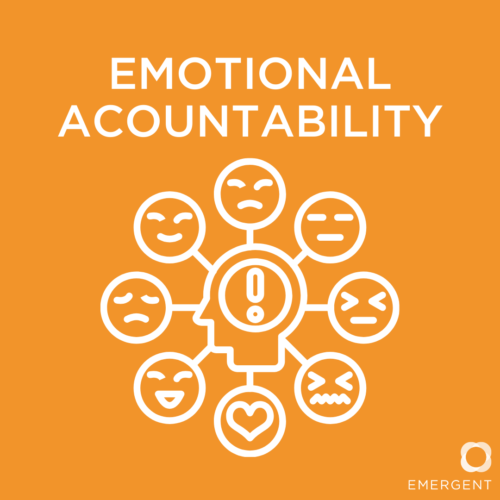For much of my adult life, there’s been a voice in my head. It’s a voice at once demanding and prideful, one that encourages me to follow its advice and rewards me handsomely for doing so. And what does it say?
Be accountable to your emotions!
I identify strongly with this voice, and consider it a reliable companion. By no means am I bragging. The voice has certainly led me to great joys, but also to great sorrows and losses. It has deterred me from tempting impulses and convinced me to say “no” to things I’d have liked to say “yes” to. But more than anything else, the voice has helped me meet whatever emotional moment I’ve encountered. It’s kept me steady, calm and gentle in situations when a soft touch is called for, and assertive, confident, and influential when stronger action is required.
If you’ve worked with me, you know I’ve been a student of emotional intelligence (EI) for well over 30 years. I was first introduced to Dan Goleman’s theoretical model of EI in the mid-1990s when he published his book, simply titled Emotional Intelligence. Five years prior, after the life-changing experience of reading Stephen Covey’s 7 Habits of Highly Effective People, I had begun a new habit of reading “business-psychology books.” Goleman’s work, like Covey’s, has stuck with me in a meaningful way, not just in my work but in my life. Its impact has been holistic and profound.
But emotional accountability is different from emotional intelligence. Thankfully, my reading habit has persisted, and I found another voice to speak my truth: Dr. Susan David, author of Emotional Agility. While she has a different name for this practice, I’ll stick with emotional accountability; it’s been my term for 30 years and counting! Here’s my definition:
Emotional accountability is being accountable to one’s emotions by feeling them and then utilizing them toward the best possible outcome.
My definition has three important parts:
Accountability of Feeling. We are feeling creatures. We learn from an early age how to think with clarity and reason, but are not adequately taught how to use our emotions to similar effect. Suppressing our feelings too long is never good. As Sigmund Freud said, “Unexpressed emotions will never die. They are buried alive and will come forth later in uglier ways.” To be accountable to our emotions, we must feel them fully, and with as little judgment as possible.
Accountability of Use: Our emotions are signals. Sometimes, what they mean is crystal clear (I need to speak my mind or I should take a few deep breaths and listen). Other times, they are more difficult to interpret. Regardless, we have a responsibility to interpret and utilize the information our emotions are trying to tell us. We can use these signals to produce the best possible outcomes.
Accountability of Context: Nothing outside of us is in our control, but we have an accountability to interact with the outside world in a useful way. This is where Goleman gets closest to describing emotional accountability with his idea of relationship management. We manage our part in every relationship. To be effective in life, we should apply our ever-changing emotions in the ever-changing and complex world around us.
I want you to reflect on where you are most accountable to your emotions, and perhaps where you could focus a bit more. It may be in your work and leadership. Perhaps it’s your personal relationships that could benefit from more emotional accountability. Wherever it is, keep up the noble work of self-development. And if you are seeking more information, coaching or guidance in this space, I hope that you’d consider reaching out to me at bill@getemergent.com. The Emergent team would be happy to help.


This Post Has 2 Comments
Fantastic article!
Excellent reminder, Bill. Keep up the good work of inspiring others to continue our leadership development.